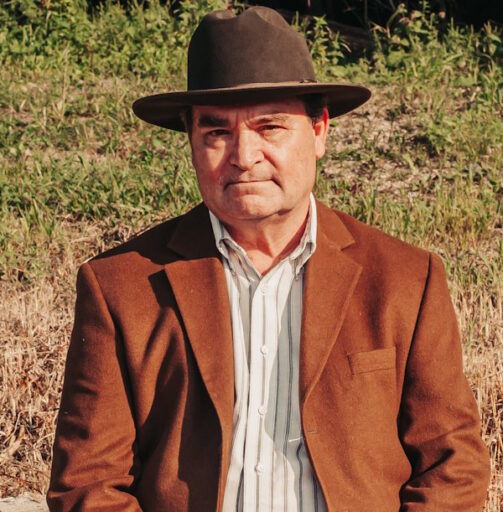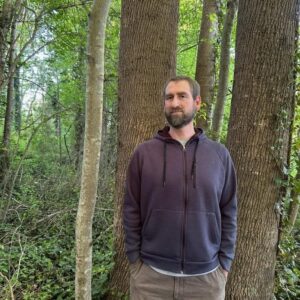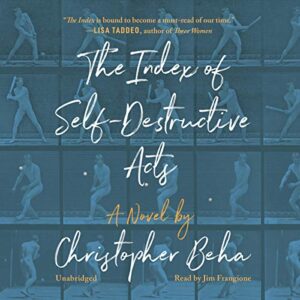We recently spoke with author John Salter about his new Slant book, There Will Never Be Another Night Like This
Two of these stories, “There Will Never Be Another Night Like This” and “Habitats” share the same protagonist, a young man named Nils. The locations and timeframes seem to mesh with your own history. They call to mind Hemingway’s Nick Adams stories, with a recurring, at least semi-autobiographical character. Are these stories autobiographical?
Yes, but not in the way people often think, when they imagine a writer neatly lifting an event from their life and putting it on paper. An experience will have a long way to go before it becomes literary fiction, and the final result might be unrecognizable. It’s like those beautiful houses people make out of shipping containers. By the time they’re finished, you forget that it started with a simple metal box. And the autobiographical part may not even be in the form of actions and people. It might be that a writer’s fears or desires are reflected in the writing, and even the writer may not be aware it’s happening.
I started writing “There Will Never Be Another Night Like This” because I was trying to remember the feeling of being very young, bold, romantic, and sort of benignly self-centered. Remember those days? A story began to emerge around this feeling. Some of the places and people and events are based on real life—the drive-in theater, for example—but the predominant autobiographical link is that sense of invincibility that Nils is enjoying, but which even he seems to realize is fleeting.
In the case of “Habitats,” some of those scenes are fairly true to life and I knew boys very much like Mark and George. Like Nils, I moved from Iowa City to Rochester, New York, and it was quite an adjustment, creating problems for the entire family, actually. Nils may well be kind of an alter ego, though his life is much more exciting than mine. But I’ll tell you what I tell my children: the parts of my work they think must be autobiographical probably aren’t, and the parts they believe have to be made up just might be real. I say this to protect them, and myself, and because I like a little mystery. It’s like in the story “Mar Vista,” when Larsen’s dying father suggests their crazy household could be turned into a novel but worries about too much being revealed. “With fiction,” his father said, “there’s always room for denial, isn’t there?” “I suppose so,” Larsen said. “They say all writing is autobiographical, but you never know for sure how close to the truth a story comes.”
Most of the stories in There Will Never Be Another Night Like This take place in the Midwest. Is this a midwestern book?
Not in the sense that the stories could only be set in the Midwest, like, for example, Willa Cather’s My Antonia. I’ve lived in eleven states, and the Navajo Nation, and all those various sensibilities, have rubbed off on me so that I never quite feel like I belong to any region. That being said, I’ve lived in the Midwest, and more specifically, the Northern Plains, off and on for many years. I came of age in North Dakota. My family has deep roots here, actually, on both my mother’s and father’s side, going back into the 1800s. And, by the way, North Dakota has a strong literary ancestry. William Gass was born in Fargo, and although he left soon after, he came back to visit enough to get material for that maddeningly nebulous, dark story, “The Pedersen Kid.” The poet Thomas McGrath is from here, and the great novelist Larry Woiwode. They were really connected, umbilically, to North Dakota, although their work was obviously transcendent.
So yes, this setting does inform my fiction much of the time. Not in a cartoonish, you betcha way, like in the movie Fargo. I can say that I’ve written more stories featuring blizzards than anyone I know, and my first collection, Alberta Clipper, was named after the weather system. But it’s usually more subtle. For example, this part of the world, on the North Dakota-Minnesota border, with it’s platter-like topography, Nordic influence, and brutal winters, seems to foster a kind of stoicism that to the untrained eye might read as indifference or even unfriendliness. In the story “In the Long Run,” Brita reveals to a man she likes that she’s getting a divorce. He says, “Well, you’ve got to do that sometimes.” Now, that may seem like a taciturn statement, almost dismissive, but people around here would see it as entirely satisfactory and compassionate.
You studied writing in North Dakota?
Yes, at the University of North Dakota, where I got my undergraduate and graduate degrees. At the time, in the 1980s, it had a pretty robust writing program, with four or five faculty in poetry and fiction and playwriting. Now I don’t think they have more than one faculty member dedicated to creative writing, which is unfortunate. My best teacher was the late William Borden, a fiction writer and playwright. He wrote a great novel called Superstoe, and his plays were produced nationally. He was not a heavy-handed teacher. Mostly, he stayed out of my way and let me try things and succeed, but often fail, and afterward we’d do some forensics to see what happened. He became a good friend, hooking me up with workshop gigs and readings over the years. And he was sincerely supportive. At one point, we both applied for a prestigious regional fellowship. I won, he didn’t, but he was the first one to call and congratulate me.
But the best part of UND was the annual writer’s conference. Each spring, they brought in writers and poets for a week. The conference was started by John Little, a Mississippi transplant, a quirky guy who drove his old Cutlass convertible all year round with the top down, even when it was thirty-below zero. He was masterful when it came to getting the right combination of writers to campus, the right chemistry. So you’d have Ernest Mickler, who wrote White Trash Cooking, along with Maxine Kumin. Norman Mailer was there during my years at UND, Susan Sontag, Larry McMurtry, Ellen Gilchrist, Joy Harjo, Jay McInerny, James Welch. Part of the deal was, the writers needed to be somewhat accessible, so there were readings, panels, receptions, and these legendary parties. So here I was, a seventeen year old kid, having a chat with Joseph Brodsky, just a few years before his Nobel Prize. How could that even happen in North Dakota?
What did you talk about with Brodsky?
I had heard that as a very young man, he was convicted by the Soviet Union of “social parasitism,” and I wanted to ask him about that, but it didn’t seem like something to bring up on a cheerful March afternoon. So I’m pretty sure we just talked about the weather. Anyway, when I think about my education as a writer, it’s those conferences I remember, not the classrooms. Of course there were the occasional duds, and people who drank a lot when they shouldn’t have, but overall, it was very beneficial. I wrote a flash fiction piece not long ago involving the conference and said, people like me were in ecstasy, drunk on literature, starstruck. And it really was like that. The conference was literary plutonium, and if you didn’t want to be a writer after a week like that, you probably never did.
Did the writers offer you any memorable advice? And what advice do you have for younger writers?
I don’t remember getting any advice. It was more about the vibe, about people coming together to celebrate the written word, on a campus and in a city that was usually preoccupied with hockey. And it turned you on to writers and books that you might not otherwise discover.
I’m always hesitant to dispense advice. There’s already too much advice out there, and much of it is very lofty and pretty but not very useful. The only serious advice I ever give isn’t even about writing, technically, but it is for people who are really committing to the writing life, who see this as a vocation. I tell them to develop some kind of passion early on, some interest, outside of the writing. This way, when the writing isn’t going well, or they’re recharging, they have something fulfilling to do. Tom McGuane has fly fishing and horses. Hemingway had big game hunting. It doesn’t have to be glamorous but it should require very different muscles and skills than writing does.
I failed to do this, though I tried. When I was in graduate school, my classmate Patrick was a drummer in a band that traveled around northern Minnesota playing at these old-fashioned supper clubs, and he said that if I learned how to play bass guitar, I could be in the band. It was the easiest instrument to learn, he said. So we went to a pawn shop and I bought a cheap bass and amp, and found a book with cassette tapes to learn from. I vividly remember pushing my chair back from my desk and hunching over this bass guitar, ready to become a musician. I’d never played an instrument. But my typewriter was just two feet away. It seemed to say, you really should be writing. There will be plenty of time for this stuff when you’re rich and famous. So I put the bass in the closet and never tried again. And that happened time and time again whenever I took up an activity. Golf, for example. I’d be out there in the middle of my backswing suddenly feeling guilty that I wasn’t at home writing. That doesn’t help your game, although I played enough to use some golf in my novel.
Now I do like learning how to do things, and I’ve had something like twenty-six different jobs since I was fourteen, everything from plumbing supply sales to technical theatre to construction to teaching at the college level. But I’m not talking about whatever work a writer does to support their art. I’m talking about a lifelong pursuit, done for enjoyment and nourishment.
Of course I was passionate about being a father, active in my three children’s lives, and in fact I won a trophy for Best Practice Attendance from my daughter’s traveling basketball team, which I’m quite proud of. But I never developed any serious interests outside of reading and writing. I don’t really know how to have fun. Now the kids are grown, so when I’m struggling, or in between projects, I basically just hang around feeling seasick, waiting for the next story to arrive, or for someone to finally give me a grandchild.





